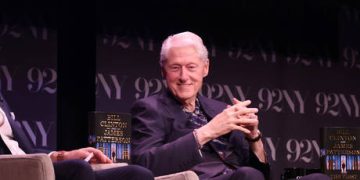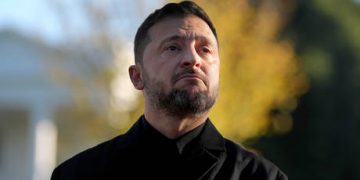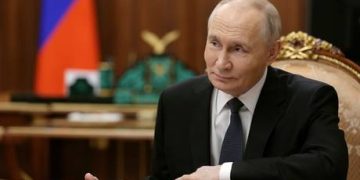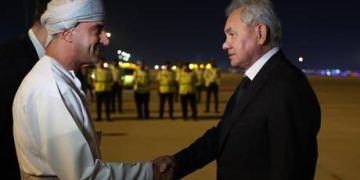August 13, 2025, 12:40 am
Author – Ali Ghanim


I first met Anas Al-Sharif in in November 2023 at the Al-Shifa Medical Complex, which was the biggest complex in the war-torn Gaza City. Israel had just ordered the evacuation of northern Gaza, a first step toward depopulating the area during an earlier stage of the genocide.
Anas was lying on the floor in front of the emergency room with tears in his eyes.
“Why are you so sad?” I asked him sardonically. “We’re still at the beginning of this movie!”
He laughed. Anas felt the weight of the war heavily, but he was still from Gaza, and we have our trademarked Ghazawi way of lighthearted humor in the face the most unfathomable loss and unbearably dark days.
Above all, Israel fears the people who tell the world about what is happening in Gaza.
“You’re right,” he responded. “The climax, the real tragedy, the end of the story, are still on the way.”
For Anas, the end would come too soon.
On Monday, Anas, 28, was targeted, along with three other Al Jazeera journalists, in an Israeli strike on a tent complex around Al-Shifa Hospital.
The Israeli government mocked him in death — even accusing him of being a Hamas operative. It’s their way of belittling Anas because he did something so small as tell our story.
Israel fears so many simple facets of Palestinian life, a child wearing a keffiyeh or a mother telling her son to fight for Palestine. Above all, though, Israel fears the people who tell the world about what is happening in Gaza — the war, the genocide, the famine. Anas made it a mission to tell these stories, our stories, all over the world. And people listened.
For me, though, Anas wasn’t just a star journalist. He shepherded me through tough times, encouraged me to do reporting, and shared his knowledge freely. Along with my father, Anas’s strength was the biggest inspiration to my life. It helped keep me going. He was a mentor and, moreover, a friend.
In the hospital that day we met, we chatted for a couple hours.
We both grew up in Jabaliya refugee camp. He knew some of my relatives.
It was Israel’s occupation that inspired him to become a journalist. Anas told me once about how, when he was still young, one of his relatives had been arrested. When the relative returned from Israeli prisons, Anas listened intently as the man narrated tales from behind bars for his family. Those were the kinds of stories — of injustice, of torture, of indignity — that needed to be told to the wider world, Anas realized.
Palestinian communities are famously tight-knit, but it was especially true in our camp, where people felt each other’s needs and wants intensely. In the camp, people supported each other at any cost. Anas was known for being close to the children in his community, connecting with them and instilling pride in them by teaching them about Palestine.
The spirit of telling people’s stories while also supporting them as human beings was ever present in his work. Anas could be seen walking through a hospital at work, microphone in hand, but pausing to express sympathy for mothers who had lost their sons.
We would both come to know tremendous loss in this war. Anas’s father was killed by Israel in an airstrike a month after our meeting. And my family home was hit by an airstrike on our densely populated neighborhood shortly before we encountered each other; my mother had been killed, and my sister landed in the intensive care unit of Al-Shifa Hospital, part of the reason I was there that day.
We were also, for the meantime, stuck. Israel was besieging the hospital. It was an affront to international norms, and Israel justified its attack with bogus propaganda about militants hiding out in tunnels beneath the complex.
We spent a lot of time together during the offensive and formed a bond that would continue until the day Anas died.
Anas pushed me further into journalism — and once I was getting my feet under me, he pushed me to keep going.
When we had met at the hospital, I’d already been taking photos. Every morning, I’d put on my nearly five-pound press vest and sprint from massacre to massacre. Darting around Gaza City, I took pictures with one hand because my other arm was severely injured in the attack that killed my family members.
“I see you’re working with one hand,” Anas said at the hospital, and I told him my story.
At the time, I had mostly been posting to social media. Anas, though, was an official journalist with Al Jazeera. He began to show me the ropes, patiently answering any questions I might have had and telling me how to interact with editors abroad.
This was a crucial part of the job for Anas: His journalism came first, but he knew that our stories needed to reach the world outside Gaza if there was any hope of international intervention to stop the genocide. We had to give a voice to our fellow Palestinians.
His journalism came first, but he knew that our stories needed to reach the world outside Gaza.
He knew it was dangerous work, but it was worth it. When I worried about a dangerous outing, Anas told me about the value of risking your life for silenced people — how if we didn’t do it, those voices may never get heard.
He also, however, understood that sometimes people needed to move on. I hadn’t been able to leave the hospital because I was with my ailing sister, but during the siege, the lack of power brought her life support down and she succumbed to her injuries. It was time to go south and reconnect with my father.
Anas understood and urged me to go — but to keep working.
He told me, “Don’t forget you survived the bombardment of your house for a reason, and you need to continue.”
I wondered about him. Why was he staying in such a dangerous place? He answered that his people were still there in the north and he would stay with them.
Eventually, I had to leave the Gaza Strip to get medical care for my injured arm and was lucky enough to get out. I ended up in the U.S. I began pursuing a degree but continued to do journalism work. And, through WhatsApp, Anas continued to be there for me — just as he was for his colleagues who were in Gaza.
I was very close with one of Anas’s colleagues at Al Jazeera, Fadi al-Wahidi. Last October, al-Wahidi was behind the camera in Jabaliya, within an area Israel had labeled a “yellow” zone — not in a forbidden “red” zone — when gunfire broke out. He was hit in the neck and paralyzed.
A few months ago, Anas began leading the charge to get his colleague evacuated to Qatar. He activated a network of contacts to prod international organizations. It would turn out to be a long fight and Anas wouldn’t see it to its conclusion.
His own work, too, was becoming more difficult. Israel’s targeting of journalists has made the genocide the deadliest war for the press in history. Anas himself had received explicit threats.
“I feel tired,” he told me a few days before he was killed. Even as he had encouraged me to leave, however, and worked to get colleagues evacuated, he had resolved to stay, to never give up. He said, “This is my land and this is my reality.”
We had been speaking for a story I am working on. Anas had, in his usual generous way, agreed to help me find sources. We set up a meeting for 5 p.m. Eastern time in the U.S. — late at night for Anas, when little would be going on. I messaged him at the appointed time, but no response came.
I sat and waited, a pit in my stomach. I opened Instagram, something I had been seeking to do less of. Immediately, I saw the news about Anas. Without thinking, reacting on instinct, I threw my phone across the room.
Anas spent so much of his life making sure other people’s stories were heard. When I got the news, however, my voice didn’t produce any words. All I could do was scream.
The post Anas al-Sharif Was My Friend. Here’s Why Israel Feared Him So Much. appeared first on The Intercept.
Full Article
Author: Ali Ghanim












